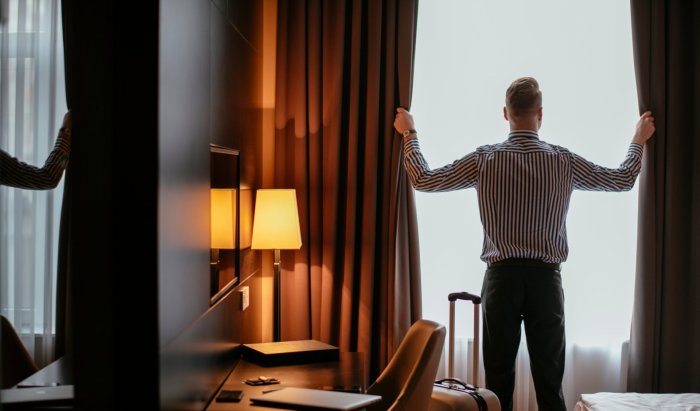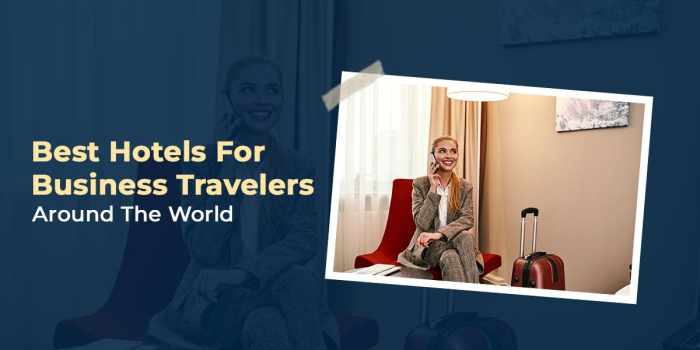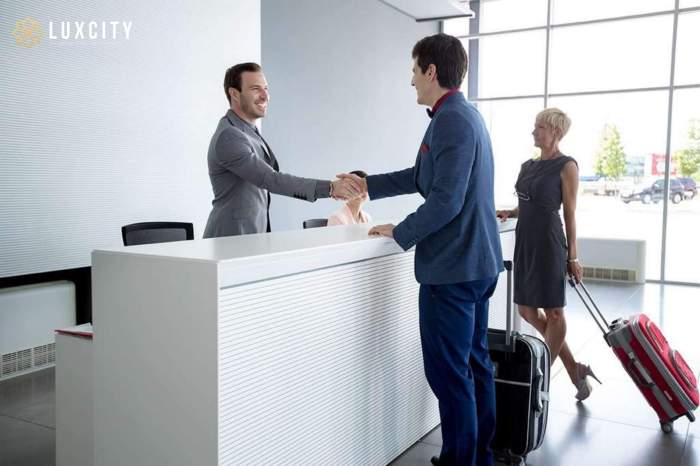Business Travel Hotels The Ultimate Guide

Business travel hotels are more than just a place to lay your head; they’re strategic hubs for productivity and comfort. This guide dives into what makes a business hotel truly exceptional, exploring everything from essential amenities and prime locations to pricing strategies and the crucial role of guest experience. We’ll uncover the secrets to finding the perfect hotel for your next business trip, ensuring your stay is seamless and productive.
We’ll examine the key factors that differentiate budget-friendly options from luxury establishments, highlighting the amenities and services that matter most to busy professionals. From high-speed internet to accessible locations and robust business centers, we’ll cover it all. Get ready to optimize your next business trip with our insider tips and insights.
Hotel Amenities for Business Travelers
Choosing a hotel for business travel often hinges on more than just a comfortable bed. The right amenities can significantly impact productivity, comfort, and overall satisfaction during a work trip. This section will explore the key amenities business travelers value and how these offerings vary across different hotel price points.
Top Five Desirable Amenities for Business Travelers
Business travelers prioritize amenities that enhance productivity and convenience. The top five consistently include features designed to streamline work and minimize disruptions.
- High-speed, reliable internet access: Essential for communication, data transfer, and remote work.
- Ergonomic workspace: A comfortable and well-lit desk and chair are crucial for extended periods of work.
- Business center facilities: Access to printers, copiers, and fax machines can be invaluable.
- Meeting rooms/conference facilities: For in-person client meetings or team collaborations.
- 24-hour room service/concierge services: Provides flexibility and caters to unpredictable work schedules.
Amenities Comparison: Luxury vs. Budget Business Hotels
The range of amenities offered significantly differs between luxury and budget business hotels. Luxury hotels typically offer a much more comprehensive and premium service.
Luxury business hotels often provide lavish extras like personalized butler service, complimentary airport transfers, access to exclusive lounges with premium food and beverages, and state-of-the-art fitness centers. Budget hotels, on the other hand, tend to focus on the essentials – a clean room, a functional workspace, and basic Wi-Fi. While they may offer some business-oriented amenities, the quality and range will be significantly less extensive. For example, a luxury hotel might offer a dedicated business center with multiple workstations and advanced printing capabilities, whereas a budget hotel may only provide a small, shared workspace with a single printer.
The Importance of High-Speed Internet Access
High-speed internet access is paramount for modern business travelers. The ability to connect reliably and quickly is no longer a luxury but a necessity. Poor internet connectivity can lead to significant disruptions, lost productivity, missed deadlines, and ultimately, negative guest satisfaction. A hotel with unreliable internet negatively impacts a business traveler’s ability to conduct essential tasks, participate in important meetings, and maintain professional communication. This directly translates into lost business opportunities and frustration for the guest. Conversely, reliable high-speed internet access contributes to a positive guest experience, fostering loyalty and positive word-of-mouth referrals.
Amenities Across Different Hotel Price Points
The following table compares amenities across three hotel price points: budget, mid-range, and luxury.
| Amenity | Budget | Mid-Range | Luxury |
|---|---|---|---|
| High-speed Wi-Fi | Basic, may have limitations | Reliable, faster speeds | High-speed, reliable, often complimentary |
| Workspace | Small desk, limited lighting | Adequate desk and chair, good lighting | Ergonomic workstation, ample desk space, excellent lighting |
| Business Center | May not be available | Basic printer/copier | Fully equipped business center with multiple workstations, advanced printing/copying, and support staff |
| Meeting Rooms | Generally unavailable | May offer small meeting rooms for a fee | Various sizes of meeting rooms with advanced A/V equipment, catering options |
Location and Accessibility

Source: kaffediary.com
Choosing the right location is crucial for a business travel hotel. It needs to strike a balance between convenient access to business districts and major transportation hubs, while also offering a comfortable and productive environment for guests. The hotel’s accessibility features are equally vital in ensuring a positive experience for all travelers.
Ideal locations for business travel hotels prioritize proximity to key business districts, ensuring easy commutes for meetings and conferences. Simultaneously, proximity to major transportation hubs like airports, train stations, and subway lines is essential for seamless arrival and departure. This minimizes travel time and stress for busy professionals. Hotels situated near amenities like restaurants, shops, and fitness centers also add value, enhancing the overall guest experience.
Accessibility Features for Business Travelers with Disabilities
Hotels are increasingly implementing innovative accessibility features to cater to the needs of business travelers with disabilities. This includes providing spacious, well-designed rooms with roll-in showers, grab bars, and adjustable-height furniture. Many hotels are adopting advanced technologies like mobile check-in and digital room keys to improve independence and ease of navigation for guests with visual impairments. Assistive listening devices in meeting rooms and clear signage throughout the hotel are further examples of accessibility enhancements. For example, the Hyatt Regency Chicago boasts numerous accessibility features including fully accessible rooms with lowered counters, visual fire alarms, and induction loop systems for hearing assistance. These improvements contribute significantly to a welcoming and inclusive environment for all guests.
Factors Influencing Business Traveler Hotel Location Choice
Three key factors consistently influence a business traveler’s hotel location choice: proximity to work locations, efficient transportation links, and the overall safety and security of the area. Business travelers often prioritize hotels within walking distance or a short commute from their meeting locations or offices. Reliable and convenient access to airports, train stations, and public transportation is also crucial for minimizing travel time and maximizing productivity. Finally, the perceived safety and security of the surrounding neighborhood significantly influence their decision-making process. A hotel in a well-lit, secure area with minimal traffic congestion is highly preferred.
Transportation Options Near a Hypothetical Business Hotel
Let’s consider a hypothetical business hotel located near a major city center. Here are some potential transportation options and estimated travel times to common destinations:
- Taxi/Ride-sharing services: Travel time to the airport: 20-30 minutes; to the convention center: 10-15 minutes; to the main business district: 5-10 minutes. These services offer flexibility and convenience, particularly for late-night or early-morning travel.
- Subway/Metro: A subway station is located within a 5-minute walk from the hotel. Travel time to the airport: 45 minutes; to the convention center: 20 minutes; to the main business district: 10 minutes. The subway offers a cost-effective and efficient way to travel across the city during peak and off-peak hours.
- Bus services: Multiple bus routes run near the hotel, offering connections to various parts of the city. Travel time varies depending on the destination and traffic conditions. Bus travel is generally a more affordable option, although travel times can be longer than other modes of transportation.
Pricing and Value

Source: cloudfront.net
Smart pricing strategies are crucial for business hotels aiming to attract and retain corporate clients. Understanding the balance between competitive rates and perceived value is key to success in this market. Different hotel chains employ various approaches, often tailoring their pricing to specific customer segments and market conditions.
Pricing Strategies of Different Hotel Chains
Major hotel chains often use dynamic pricing models, adjusting rates based on demand, seasonality, and competitor pricing. Luxury brands tend to maintain higher, consistent rates, emphasizing exclusivity and superior service. Mid-range chains might offer more flexible pricing, utilizing promotions and loyalty programs to attract business travelers. Budget chains typically focus on competitive base rates, adding value through bundled services. These strategies aren’t mutually exclusive; a single chain might employ a mix of approaches across its portfolio. For example, a luxury brand might offer corporate rates for long-term stays, while a budget chain might increase prices during peak business travel periods.
Offering Value Beyond the Basic Room Rate
Simply offering a competitive room rate isn’t enough in the business travel market. Hotels need to showcase the added value they provide to make their offerings attractive. This could involve enhancing the overall guest experience with amenities and services tailored to the needs of business travelers. For instance, reliable high-speed internet access, comfortable workspaces, and well-equipped business centers are essential.
Examples of Value-Added Services for Business Travelers
Value-added services can significantly enhance a business trip. Consider these examples: complimentary airport shuttle services, on-site fitness centers, convenient meeting rooms, late check-out options, and business-friendly amenities like printers and scanners. Providing healthy breakfast options and readily available grab-and-go meals caters to busy schedules. Loyalty programs offering points or upgrades for repeat stays incentivize return business. Partnerships with local businesses, offering discounts on services like dry cleaning or car rentals, add further value.
Pricing Comparison of Similar Hotels in Three Major Cities
The following table compares pricing for similar hotels in New York City, London, and Tokyo. Note that prices are estimates and can vary based on seasonality and availability. Room size and amenities are also key factors influencing the final cost.
| City | Hotel Name (Example) | Room Type (e.g., Business King) | Approximate Price (USD per night) |
|---|---|---|---|
| New York City | The Grand Hyatt New York | Business King Room | $400 – $600 |
| London | The Savoy | Deluxe Business Room | $500 – $800 |
| Tokyo | Park Hyatt Tokyo | Business Suite | $700 – $1200 |
Business Services and Facilities
For business travelers, a hotel is often a temporary office. Providing robust business services is crucial for attracting and retaining this clientele. These services should seamlessly integrate with the overall hotel experience, offering convenience and efficiency to maximize productivity during their stay.
Essential Business Services
Business hotels should offer a range of services designed to meet the diverse needs of business travelers. These services should go beyond the basics and cater to a variety of work styles and technological preferences. This ensures a smooth and productive experience for guests.
- High-speed, reliable internet access: This is non-negotiable. Guests need consistent, fast Wi-Fi throughout the hotel, including their rooms and meeting spaces.
- Printing, scanning, and copying facilities: A well-equipped business center should offer these essential services, allowing guests to manage documents easily.
- Meeting rooms and conference facilities: Various sizes of meeting rooms, equipped with audiovisual technology, are vital for business travelers needing space for presentations or collaborations.
- Dedicated business center staff: Having staff available to assist with technical issues, printing needs, or other requests enhances the guest experience.
- Secretarial services (optional): Offering services like typing, transcription, or faxing can be a valuable differentiator for some hotels.
Ideal Business Center Design and Equipment
The design of a hotel’s business center should prioritize functionality, comfort, and a professional atmosphere. The space should be well-lit, and quiet, and offer a variety of workspaces to cater to different preferences.
- Individual workstations with ergonomic chairs and ample desk space: Each workstation should be equipped with power outlets and network connections.
- Comfortable seating areas for informal meetings or collaborative work: These areas should be conducive to relaxed yet productive conversations.
- State-of-the-art printing, scanning, and copying equipment: Reliable and high-quality equipment is crucial for efficient document management.
- Audiovisual equipment for presentations: Projectors, screens, and sound systems should be available for various meeting room sizes.
- Secure storage for laptops and other valuables: Lockers or secure desks should be provided to ensure the safety of guest belongings.
Leveraging Technology to Enhance Business Services
Hotels can significantly improve their business services by integrating technology effectively. This can lead to increased efficiency, improved guest satisfaction, and a more competitive edge.
- Mobile check-in/check-out: Guests can avoid long queues and manage their stay through a mobile app, freeing up time for work.
- Digital key access: Eliminating physical keys streamlines the check-in process and offers enhanced security.
- Integrated booking systems for meeting rooms and equipment: Guests can easily reserve meeting rooms and equipment through an online portal.
- Virtual assistants for guest services: Chatbots can provide instant answers to common questions, freeing up human staff for more complex tasks.
- High-speed internet with multiple access points: Reliable and fast internet is essential, and offering multiple access points ensures coverage throughout the hotel.
Potential Partnerships to Enhance Business Services
Strategic partnerships can significantly enhance the services a hotel offers business travelers, providing added value and convenience.
- Local transportation providers: Partnering with taxi services, ride-sharing companies, or car rental agencies offers guests convenient transportation options.
- Corporate event planners: Collaborating with event planners can help hotels attract corporate events and offer comprehensive event management services.
- Nearby restaurants and cafes: Offering discounted rates or special menus at nearby establishments provides guests with convenient dining options.
- Local businesses offering specialized services: Partnerships with businesses offering services like translation, legal advice, or IT support can cater to specific business needs.
- Technology providers: Partnering with companies offering advanced communication or productivity tools can enhance the business center’s offerings.
Guest Experience and Reviews
Guest reviews are the lifeblood of any hotel, but especially crucial for business travel hotels. They provide invaluable feedback, influencing booking decisions more than almost any other factor. Positive reviews build trust and credibility, attracting high-value business travelers who prioritize efficiency and comfort. Conversely, negative reviews can severely damage a hotel’s reputation and bottom line.
Positive guest experiences directly translate into positive reviews, driving bookings and increasing revenue. Understanding what drives these reviews is key to optimizing a hotel’s business travel offerings.
Importance of Guest Reviews for Business Travelers
Business travelers often have specific needs and expectations, making their reviews particularly insightful. They frequently prioritize efficient check-in/check-out processes, reliable Wi-Fi, comfortable workspaces, and convenient access to business services. Reviews highlighting these aspects significantly influence other business travelers’ booking choices. Analyzing reviews allows hotels to identify areas for improvement and capitalize on their strengths to enhance their offerings. For example, consistent praise for a hotel’s fast and reliable internet will attract more business travelers than generic positive comments.
Hotels Excelling in Business Traveler Experiences
Several hotel chains consistently receive high praise for their business-focused amenities and services. The Hyatt Regency chain, for instance, is often lauded for its well-equipped business centers, comfortable workspaces, and reliable technology. Marriott’s M Club lounges offer exclusive amenities like complimentary breakfast and evening hors d’oeuvres, catering to the needs of frequent business travelers. These hotels understand that business travelers require more than just a bed; they need a productive and comfortable environment. Their success stems from actively addressing these specific needs.
Factors Influencing Guest Reviews for Business Travelers
Several key factors heavily influence business travelers’ reviews. These include the speed and efficiency of check-in/check-out, the quality, and reliability of Wi-Fi, the availability and comfort of workspaces (desks, ergonomic chairs, good lighting), the quality of business services (printing, faxing, meeting rooms), and the overall convenience of the hotel’s location and accessibility to transportation hubs. Furthermore, the responsiveness and helpfulness of hotel staff play a crucial role in shaping a positive guest experience. Negative reviews often highlight issues with these specific aspects.
Example of a Positive Guest Review
I recently stayed at the “Executive Suites Hotel” for a week-long business trip. From the moment I arrived, the experience was exceptional. The check-in was seamless, and the staff was incredibly friendly and helpful. My suite was spacious and well-equipped, with a comfortable workspace that included a large desk, ergonomic chair, and excellent lighting. The high-speed Wi-Fi was consistently reliable, which was crucial for my work. I also appreciated the readily available business services, including printing and faxing capabilities. The hotel’s location was perfect, with easy access to public transportation and nearby business districts. I highly recommend the Executive Suites Hotel to any business traveler seeking a productive and comfortable stay.
Marketing and Branding for Business Travelers

Source: blueberrygroup.org
Attracting business travelers requires a targeted approach that understands their needs and preferences. This differs significantly from leisure travel marketing, focusing on efficiency, convenience, and professional environments. Effective strategies leverage digital channels, build strong brand identities, and offer loyalty programs to cultivate repeat business.
Effective Marketing Strategies for Attracting Business Travelers
Marketing to business travelers demands precision. Generic campaigns won’t cut it. Instead, focus on highlighting aspects crucial to this demographic: reliable Wi-Fi, comfortable workspaces, proximity to business districts, efficient check-in/check-out processes, and corporate rate options. Digital marketing, particularly search engine optimization () and targeted advertising on professional networking sites like LinkedIn, is crucial. Content marketing, such as blog posts or articles focusing on business travel tips or industry news, can also establish credibility and attract potential customers. Partnerships with corporations or business organizations can generate leads and create valuable brand associations. Email marketing, when personalized and strategically timed, can nurture leads and promote special offers.
Comparison of Branding Approaches of Two Hotel Chains Targeting Business Travelers, Business travel hotels
Let’s compare Marriott’s approach to that of Hyatt. Marriott, with its diverse portfolio (Courtyard, Renaissance, JW Marriott), emphasizes a tiered approach, offering various brands to cater to different business traveler budgets and needs. Their branding consistently highlights reliability, consistency, and a broad range of amenities. Hyatt, on the other hand, often focuses on a more upscale and sophisticated image, emphasizing design, personalized service, and exclusive experiences. Their branding aims to position them as a premium choice for discerning business travelers. Both successfully target business travelers but through distinct brand personalities and service offerings.
Importance of Loyalty Programs for Business Travelers
Loyalty programs are indispensable for attracting and retaining business travelers. Frequent business trips mean these travelers are constantly seeking value and convenience. A well-structured loyalty program offers rewards, such as points redeemable for free nights or upgrades, priority check-in, complimentary amenities, or exclusive access to lounges. These incentives encourage repeat bookings and build brand loyalty. Furthermore, data collected through loyalty programs provides valuable insights into customer preferences, allowing hotels to personalize their offerings and improve their services. For example, a program might offer personalized recommendations based on past stays or provide early access to new promotions.
Marketing Campaign Targeted at Attracting Business Travelers
This campaign, titled “Your Business, Our Priority,” will focus on highlighting the seamless integration of work and relaxation. Key messaging will emphasize efficient check-in, reliable high-speed internet, comfortable workspaces, and convenient locations near business districts. We’ll utilize a multi-channel approach. LinkedIn and other professional networking sites will be targeted with visually appealing ads showcasing the hotel’s modern amenities and business-friendly environment. Email marketing will be used to nurture leads generated through online advertising and partnerships. Content marketing will consist of blog posts offering tips for productive business travel and articles highlighting the hotel’s commitment to providing a comfortable and efficient experience. Partnerships with local businesses and corporations will provide opportunities for cross-promotion and targeted outreach. The campaign will track key performance indicators (KPIs) such as website traffic, lead generation, and booking conversions to measure its effectiveness and make data-driven adjustments.
Last Word: Business Travel Hotels

Source: luxcity.com
Choosing the right business travel hotel can significantly impact the success of your trip. By understanding the factors discussed – amenities, location, pricing, business services, and guest experience – you can make informed decisions and select a hotel that aligns perfectly with your needs and budget. Remember to prioritize what matters most to you, whether it’s high-speed internet, a convenient location, or exceptional customer service. Happy travels!
Common Queries
What’s the best way to find deals on business travel hotels?
Use hotel booking websites that allow for flexible date searches and price comparisons. Consider booking in advance or during off-peak seasons for better rates. Also, look for corporate discounts or loyalty program benefits.
How important are hotel reviews for business travelers?
Extremely important! Reviews provide valuable insights into a hotel’s actual service quality, reliability of amenities (like Wi-Fi), and overall guest experience. Pay close attention to reviews mentioning business-related aspects.
What should I do if I encounter a problem during my stay at a business hotel?
Immediately contact the hotel’s front desk or management. Most hotels have dedicated staff to address guest concerns. Document the issue and follow up if necessary. If the issue isn’t resolved, consider contacting the hotel chain’s customer service.
Are there any tax benefits for business travel hotel stays?
Potentially, yes. Tax laws vary by country and region. Check with your tax advisor or relevant government agency to understand the applicable rules and regulations regarding deducting business travel expenses, including hotel stays.
Comments are closed.